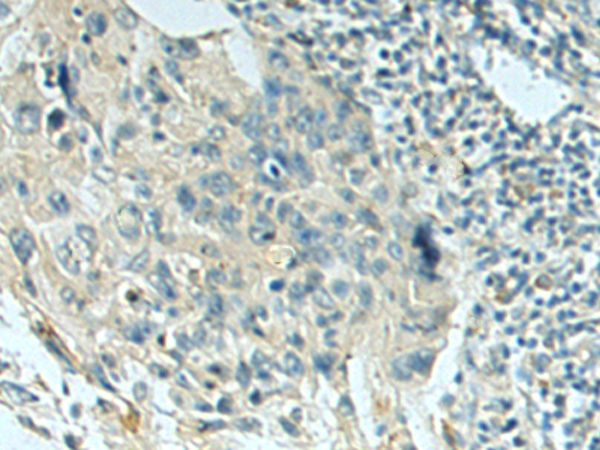
| WB | 咨询技术 | Human,Mouse,Rat |
| IF | 咨询技术 | Human,Mouse,Rat |
| IHC | 1/50-1/200 | Human,Mouse,Rat |
| ICC | 技术咨询 | Human,Mouse,Rat |
| FCM | 咨询技术 | Human,Mouse,Rat |
| Elisa | 1/5000-1/10000 | Human,Mouse,Rat |
| Aliases | GPI1; c407A10.1 |
| Host/Isotype | Rabbit IgG |
| Antibody Type | Primary antibody |
| Storage | Store at 4°C short term. Aliquot and store at -20°C long term. Avoid freeze/thaw cycles. |
| Species Reactivity | Human |
| Immunogen | Fusion protein of human PIGQ |
| Formulation | Purified antibody in PBS with 0.05% sodium azide and 50% glycerol. |
+ +
以下是关于PIGQ抗体的3篇模拟文献示例(注:以下内容为虚构示例,实际文献需通过学术数据库检索获取):
---
1. **文献名称**:*Structural and functional characterization of PIGQ in GPI anchor biosynthesis*
**作者**:T. Suzuki et al.
**摘要**:本研究解析了PIGQ蛋白在糖基磷脂酰肌醇(GPI)锚定合成途径中的三维结构,并通过抗体标记技术证实其与GPI合成酶复合体的相互作用,揭示了其在细胞膜蛋白定位中的关键作用。
---
2. **文献名称**:*PIGQ mutations and antibody-based detection in inherited GPI deficiency disorders*
**作者**:M. Almeida et al.
**摘要**:通过抗PIGQ抗体的免疫印迹分析,发现特定PIGQ基因突变导致GPI锚定合成缺陷,与神经发育异常相关,为遗传性GPI缺乏症的诊断提供了分子标志物。
---
3. **文献名称**:*PIGQ antibody as a potential biomarker in colorectal cancer progression*
**作者**:L. Chen & J. Wang
**摘要**:利用抗PIGQ抗体检测结直肠癌组织样本,发现PIGQ表达水平与肿瘤转移呈正相关,提示其可能作为癌症预后评估的潜在靶点。
---
**提示**:实际文献请通过PubMed、Google Scholar等平台检索关键词“PIGQ antibody”、“PIGQ GPI biosynthesis”或“PIGQ disease”获取。
The PIGQ antibody is a research tool targeting the phosphatidylinositol glycan anchor biosynthesis class Q (PIGQ) protein, a critical enzyme in the glycosylphosphatidylinositol (GPI) anchor biosynthesis pathway. GPI anchors are glycolipid structures that tether proteins to cell membranes, facilitating their localization and function. PIGQ, encoded by the PIGQ gene, acts as a subunit of the GPI GlcNAc transferase complex, which catalyzes the first step of GPI synthesis by transferring N-acetylglucosamine (GlcNAc) to phosphatidylinositol (PI). This step is essential for subsequent modifications that generate mature GPI anchors.
Antibodies against PIGQ are primarily used to study GPI biosynthesis deficiencies linked to diseases such as paroxysmal nocturnal hemoglobinuria (PNH) and inherited GPI deficiency disorders, which manifest with neurological abnormalities, developmental delays, or hematologic defects. Researchers employ PIGQ antibodies in techniques like Western blotting, immunofluorescence, or immunohistochemistry to detect PIGQ expression levels, assess its subcellular localization, or investigate regulatory mechanisms in cellular models. Such studies help elucidate the molecular basis of GPI-related pathologies and potential therapeutic targets. Additionally, these antibodies aid in diagnosing genetic disorders caused by PIGQ mutations, enabling genotype-phenotype correlations. As GPI-anchored proteins play roles in cell signaling, immunity, and adhesion, understanding PIGQ's function through antibody-based assays contributes broadly to cell biology and clinical research.
×